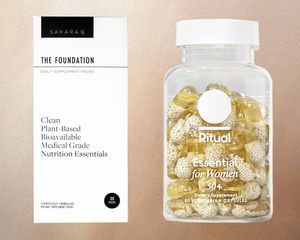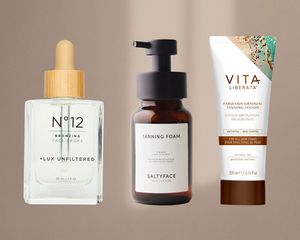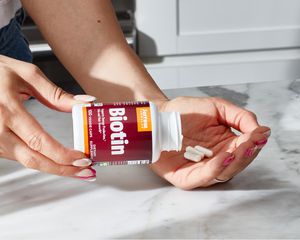:max_bytes(150000):strip_icc()/coffeecreamer-e85689c712f549319359f8be5e1f085f.jpg)
Stocksy
There's nothing like a hot cup of coffee or rich cold brew to get you out of bed on a dreary, early morning (or, let's be real, most mornings). Whether you drink coffee for the caffeine, the taste, the antioxidants—or all of the above—it can wield a number of benefits. Still, not all coffees are created equal, and we're not just talking about single-origin versus Nescafé. What you put in your coffee, is equally as important as the coffee itself.
Unless you're a coffee purist and take your java black, you're probably adding milk, or some version of it, to your cup. Coffee creamer, one of the most popular coffee additives, is lauded by some for enhancing the flavor of coffee and cutting its acidity. But, what about its effect on your health? Is it possible that this seemingly innocuous indulgence is sabotaging your diet? We spoke with a team of medical experts to find out more.
Keep reading to learn about whether coffee creamer is healthy or not.
What Is Coffee Creamer?
Okay, so you've been adding it to your cup of joe for years, but what exactly is coffee creamer, anyway? "A vast majority of coffee creamers contain water, sugar, and hydrogenated oil we know as a trans fat," says Nikola Djordjevic, MD, a board-certified family physician and medical advisor to Health Careers. "We consume trans fats when we eat animal products; however, if we take too much of trans fats, we’re putting ourselves at risk of raising LDL (or 'bad' cholesterol)." According to Harvard Medical School, with "every 2% of calories from trans fat consumed daily, the risk of heart disease rises by 23%." Yikes!
In addition to trans fats, flavored coffee creamers are often high in added sugar, with around five grams of sugar per tablespoon. This can really add up if you don't stick to the serving size. "Ideally, it is best to avoid any added sugar, but one to two grams should be your limit," advises Lisa Richards, a registered dietitian and author of The Candida Diet. When it comes to a liquid or powdered variety, there probably isn't much of a difference nutrition-wise. "Powdered creamers are a bit less offensive than they used to be with the banning of trans fat from partially hydrogenated oils," says Diana Gariglio-Clelland, a registered dietitian at Balance One Supplements. "However, they still often contain added sugars and saturated fats in the form of palm kernel oil," she adds.
Is Coffee Creamer Bad for You?
Unsurprisingly, the experts we spoke with aren't thrilled about using coffee creamer as a daily dietary staple. However, Djordjevic urges us to think more holistically about overall eating habits. "Bottom line, everything can be a health hazard if we take it too much," he says. "That’s why the best thing we can do to our health is to be moderate in everything we do." In other words, if you stick to the serving size of one tablespoon per day of coffee creamer, and your overall diet isn't full of trans fat and sugar, then moderate consumption of creamer won't likely derail your healthy eating efforts.
Of course, if you're using more than one serving per day, you could be consuming a lot more fat and sugar than you might think. Kristen Carli, a registered dietitian and owner of Camelback Nutrition & Wellness, says, "Ask yourself: How much creamer do you put in per cup? How many cups do you drink each morning? Depending on the type of creamer and how much you put in your coffee each morning, you can very easily hit your limit on added sugars per day." The American Heart Association (AHA) recommends limiting the amount of added sugars you consume to no more than 6% of your daily caloric total, aka six teaspoons for women and nine teaspoons for men.
Healthier Alternatives to Coffee Creamer
Don't lose all hope in adding a creamy element to your coffee, though. "There are plenty of coffee creamers that are fat-free, but using traditional milk, whether dairy or plant-based, is likely the healthiest route to go,” says Richards.
Gariglio-Clelland agrees: "A few healthy coffee creamers I would recommend include SO Delicious Coconut Creamer as a dairy alternative and Natural Bliss All Natural Sweet Cream as a healthy dairy creamer. The benefit of these two creamers is that they don't contain added sugar." Fair warning: Gariglio-Clelland is wary of anything marketed as a "superfood creamer." She explains, "The best true superfoods are whole foods, not processed foods with labels."
Finally, if these alt-creamers aren't cutting it in the flavor category, Richards suggests adding monk fruit to sweeten your coffee. "It's naturally sweet because it's high in antioxidants, which means you're not only avoiding inflammatory ingredients by not using processed creamers or sugar, but you are giving your body anti-inflammatory nutrients," she says.
The Final Takeaway
If the idea of drinking your coffee black or using a coffee creamer alternative, doesn't enthuse you, there's good news: Taking your coffee with creamer isn't necessarily a bad thing. However, if you take your creamer with coffee (aka "light and sweet") you might be serving yourself a major sugar bomb. The solution? Use coffee creamer in moderation. Sure, it might not be the most novel of ideas, but according to experts, it's effective.


